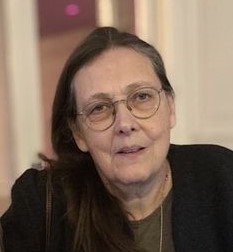‘I write letters to prisoners on death row every week – and here’s why’

Story by Sian Elvin, Metro, 1 January 2023.
‘Imagine you’re convicted. You then spend 15 or 20 years on death row. I want you to think about what that might be like, with the worst of the worst – people who are like you and struggling. Then you’re executed…
‘Now I want you to imagine you are innocent. For me, that situation would be barbaric, and one should never underestimate the grief and the trauma it could cause.’
Mat Prountzos, who lives in Liverpool, writes 10-page letters to an inmate on death row in California, called Peter*, every week.
He first got in touch with the prisoner after making enquiries with charity LifeLines, which has supported prisoners on death row across the US through letter writing since 1988, when he read about its work in the Metro newspaper some 15 years ago.
‘I really felt for the people on death row so yeah, I started writing,’ Mat said. ‘I started to get letters back and well, it developed from there.’
At the beginning of 2022 there were just under 2,500 inmates on death row in the US, according to the Death Penalty Information Center.
There have been 1,557 executions since 1976 and 17 people were killed in 2022, usually today by lethal injections. An average of nearly four wrongly convicted prisoners are released every year with evidence of their innocence.
For Mat though, who has grown close to Peter over the years they have been exchanging letters, it’s not necessarily about innocence – he thinks the very notion of death row is ‘abusively cruel’.
‘I just can’t get my head around somebody who is put in a cell, and might spend 22 hours a day in that cell – or more if there’s a lockdown – day in, day out, week in, week out, where everybody wants you dead,’ he told Metro.co.uk.

‘My pen pal desperately wants to repent, to rehabilitate, and he’s just in hell. People would say, rightly so. But it’s a question of, as a world, what we are wanting to do with the people who play outside the rules to the point where they are a danger to society.
‘It’s kind of a really sick game that’s being played, with thousands of people on death row. Is it really working? Is it a deterrent?’
He pointed out how those given the death penalty are considered an ongoing threat to society at the point of conviction – but suggested they may not always continue to be.
‘The irony for me is that the people on death row could probably rehabilitate in 20, 30, 40 years’ time,’ added Mat, an actor and communication skills specialist in his 50s.
‘The ones who are psychopathic or with serious mental health problems are put into a mental health institution and are treated with kindness and care. So there’s a real lack of joined-up thinking, in my opinion.
‘There’s got to be a better way of making people become better citizens.’

Mat said if he’s ever challenged over his decision to write to prisoners who are convicted murderers, ‘people are entitled to their opinion of “lock away the key”‘.
He adds that since they’ve been communicating Peter has recently been taken off death row and will now have to serve life without parole in prison.
‘Since then I’ve hardly heard from him, and I’m suspecting now that he knows he’s never going to get out of prison,’ said Mat. ‘I think he’d rather die than spend the rest of his life behind bars.
‘I don’t know, but reading between the lines I think he’s given up. So, I just write. It puts all of one’s petty little grievances and problems in life into perspective.
‘It’s like a stream of consciousness, in some ways. It shines a light on the world in a way which Peter will never get to see – I don’t know if it makes him feel better or worse… hopefully not worse.
‘I think hope and trust is the thing, and with a lot of people there is neither of them – and when you lose those, you’re a very dangerous individual.’
Capital punishment can currently be carried out in 20 states in the US, and it is paused in an additional seven where it is legal, as well as at a federal level.
A death sentence can only be given to defendants convicted of capital offences such as murder or treason, and a jury must decide whether to impose it.
For Rosemary Power, who lives in Scotland, writing to prisoners on death row as she has been doing for 26 years is also a welfare issue.
‘My view is you’re writing to them, and why they’re there is not your business,’ the 68-year-old tells Metro.co.uk.
‘It’s not that I don’t care; I know there will be victims somewhere out there. It’s more that it’s not my affair, that’s the affair of the legal system. What I am doing is humanitarian, and people are human whatever.’
She told Metro.co.uk the tale of her pen pal, Twin*, who had been on death row for 17 years already by the time she started writing letters to him.

‘Twin’s story has really touched me because we’ve become very good friends, and the feeling is mutual,’ she said.
‘For the first six months, I got no answer. I then got a very stilted but polite letter saying thank you and that he would write – he had just been thinking about it.
‘Though we’ve never physically met, after a number of years we managed to get a phone call, and he’s perfectly articulate.’
Twin was on death row for 21 years in total before he was taken off it, and moved to the main prison. By then he had turned to his childhood religion of Islam.
‘He helps with basketball refereeing, that kind of thing, and his family has stuck with him,’ said Rosemary, who is a retired writer and former academic.
‘I wrote to his sister to send him some money and she wrote back and said: “I’m glad you’re writing to him, he’s done some wrong things but he’s a good man.”
‘At one stage, he was mentoring a young man, a 23-year-old who was sharing his cell, and the young man decided to fast for Ramadan with him, even though he was Catholic by background.
‘The system hadn’t allowed for two meals at the end of the day to break the fast, so they had to share one. If you’re 23 and only getting half a dinner at the end of the day, that’s a big commitment.
‘Things like that show humanity, despite the threat of being executed by a fairly horrible injection being over them all the time.’
Rosemary said when she started her journey with LifeLines she found there is ‘a lot of kindness’ among inmates and there is ‘very little self-pity’.
While Twin was on death row she went in to hospital for a major operation. When she returned home she received a get well card signed by everyone on that state’s death row of around 40 people.
‘It was a hefty card and they don’t have any money, so it must have cost somebody something,’ she added.
Both she and Mat noted how even sending a letter is a great sacrifice for inmates as they often can’t afford paper, envelopes or stamps – which is why some time can pass before replies are received.
Rosemary also spoke of another pen friend who has been on death row for 46 years, but is in a state which is under a moratorium (a pause on capital punishment being carried out).
She told an extraordinary story of how he ‘retained his dignity and sense of achievement’ by deciding to take his school exams – which he never completed – while in prison.
Rosemary explained: ‘He was invigilated by the education officer sitting outside his cell on death row and got his school exams – although later than most!
‘Other inmates even turned their televisions down so he could concentrate.’
Jan Arriens founded LifeLines in 1988 after he was ‘incredibly touched’ by the BBC documentary Fourteen Days In May, which followed the final fortnight of the life of Edward Earl Johnson who was executed in Mississippi.
He told Metro.co.uk: ‘I wrote to the BBC and miraculously got a reply with the names of the three prisoners and wrote to them, and got replies from them all – they were well-expressed, and quite unlike anything I expected to receive from death row.
‘I had stereotypical images of brutish, unfeeling men, but these were totally different.
‘Even at that early stage, I wondered if they were representative of death row as a whole and what’s going on.’

Membership for the organisation quickly shot up – reaching 2,600 people at one stage – and it received charitable status before the pandemic.
Jan, who is based in the West Midlands, said: ‘I think some people are just horrified that a civilised western country can lock people up, under sentence of death, for periods of up to nearly 40 years.
‘There are some who are actively against the death penalty, but I think the predominant thing is probably compassion, because of the awful predicament these people are in.
‘It’s the relentless, cold-blooded, heartless countdown to death.’
He said he truly believes the majority of people are on death row because they’ve been ‘dealt a lousy hand in life’, adding, ‘Many of them got sentenced at a pretty young age for some misdemeanour carried out in their late teens or early twenties.
‘They were young tearaways, a lot of them had been on drugs or alcohol and were unemployed or drifting.
Key facts about death row and capital punishment in the US
- Number of executions since 1976: 1,557 (17 in 2022)
- More than 75% of the murder victims in case resulting in an execution were white, even though nationally only 50% of murder victims generally are white
- Jurors in Washington state are three times more likely to recommend a death sentence for a black defendant than for a white defendant in a similar case
- The odds of a death sentence in Louisiana were 97% higher for those whose victim was white than for those whose victim was black
- In 96% of states where there have been reviews of race and the death penalty, there was a pattern of either race-of-victim or race-of-defendant discrimination, or both
- Studies claiming the death penalty has a deterrent effect on murder rates were found to be ‘fundamentally flawed’ and should not be used when making policy decisions
- 88% of experts surveyed rejected the notion that the death penalty acts as a deterrent to murder
- 30 states, plus the US government, use lethal injection as their primary method, with some states using other methods as backups
- There were 51 women on death row as of October 1, 2021 (2.08% of the total death row population)
17 women have been executed since 1976 - A majority of voters in the US (61%) would choose a punishment other than the death penalty for murder when asked in 2010
Information sourced from the Death Penalty Info factsheet.
‘They are almost invariably from a terrible home background with alcoholic or violent parents, or were abused or sexually abused, and that eventually leads to some very serious crime and there they are on death row.
‘Some people say they are fortunate to be there, as their fate would have worse otherwise.’
Jan said the writers who reach out to inmates are surprised to find they are just ‘ordinary people… with a full gamut of human emotions’.
‘It’s not that they’re all psychologically stunted and cut off,’ he added.
‘The outstanding thing to me is that if I were to put myself in their position, I would come out full of anger and rage and wanting revenge for being on death row – instead they usually come out having worked through all that with an extraordinary lack of bitterness towards the state.
‘It’s as though they’ve arrived in a different place. I can’t say I fully understand that process, but we’ve seen it so often it’s clearly a very real phenomenon.’
Jan warned if people are considering writing to a prisoner, they should remember there are potential risks involved.
‘At the beginning we thought the prisoners would be far more manipulative than they are, and you do get some who try to manipulate people out of money, but that’s been the exception rather than the rule,’ he said.
‘I think with women writing to men, romance is an ever-present threat, because the men are in an absolutely desperate, isolated position where they would have no physical contact with a woman whatsoever. Women need to be clear of their boundaries.
‘Getting embroiled in the legal system also happens very easily because many prisoners will say they are “innocent”, even if they’re not,’ adds Jan. ‘As you get to know someone well, I suppose you go out to bat for them.
‘Another difficulty which people need to be aware of – and it’s a very obvious one – but that the person they’re writing to could get executed. You’ve got to be mentally prepared for that.’
Rosemary said she is committed to writing to her pen friends ‘for good, until death parts us’.
‘There is redemption; people do change,’ she insists. ‘Some of the people I’ve known have changed dramatically and certainly if Twin ever got out I would be privileged to meet him. I’ve learnt a lot and made good friends out of it.’
Jan agrees. ‘You see human beings really stretched to their limits and rising above just about the worst that humanity can throw at them, and they’ve got to deal with their own remorse, and the crushing weight of the state trying to kill them,’ he says.
‘And then they get a letter from the other side of the world, and their own family may well have abandoned them – so in that sense, the correspondence becomes a lifeline.’
A few days after his interview with Metro.co.uk, Mat got back in touch to share he had finally heard from his pen pal, who sounded as if he was in a very bad place.
The prisoner’s letter concluded: ‘I’ll go for now. You are truly my best friend, I truly don’t deserve a friend as fine as you.’
Mat added in his email to us: ‘I in no way want this to sound like I am blowing my own trumpet, but this is the effect writing to someone on death row has.’
* Some names in this story have been changed.
Visit the Metro to see the original article (some of the photos have been changed).
